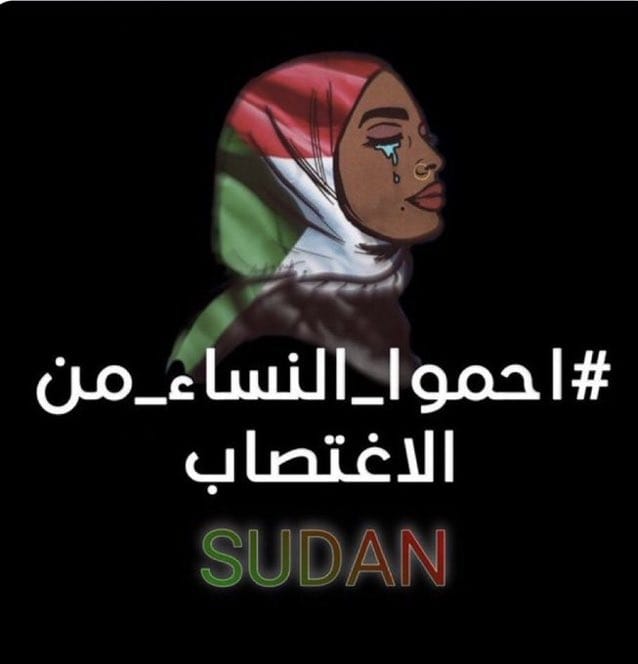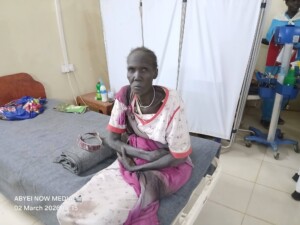Campaigners call for changes to Sudan rape legislation

#Protect_Women_Against_ Rape - Social media campaign by Sudanese activists against sexual violence (Image: X)
On Saturday, the Together Against Rape and Sexual Violence campaign sent a memorandum to Sudan’s Attorney General Mubarak Osman demanding that ‘Form 8’ and territorial jurisdiction for victims of rape and sexual violence is paused while the war continues. Osman has agreed to a meeting.
Lawyer En’aam Ateek, a member of the campaign which was officially launched from Khartoum in January, told Radio Dabanga that it is even more difficult than usual for victims of rape and sexual violence to obtain a Form 8* report during the current war.
Victims have often been displaced from the area where the crime took place due to ongoing fighting. In addition, the delays in opening a Form 8 report take too much time if the person wishes to have an abortion or receive treatment for the pregnancy.
The memorandum sent to the attorney general noted that cases of rape and sexual violence rise significantly during times of war and armed conflict, with the process of reporting and access to justice slowed down due to lack of effective law enforcement agencies in some affected areas.
Rape documentation
The campaign documented in two reports 245 cases of sexual assault, mostly women and seven men.
In its first report, the campaign documented 189 cases of rape in six states from April 15 to December 31, with 185 of the victims being female and four male. The victims range in age from 11 to 45 years. Minors (under 18 years old) make up 46 per cent of cases, and young men and women (aged 18 to 34) 42 per cent.
Sara El Tijani, another campaign member, told Radio Dabanga that 42 per cent of these sexual assault incidents occurred in Tawila and Kutum in North Darfur, 18 per cent in Khartoum, 18 per cent in Central Darfur, and 22 per cent unlocated.
In the campaign’s second report, 56 cases of sexual assault in four states from December 15 to February 5 were documented. Among the victims, 53 were women and three were men. Minors constituted 25 per cent of the victims. Wad Madani, capital city of El Gezira, recorded the highest percentage of cases, 48 per cent. North Darfur recorded 34 per cent of cases and Khartoum 12 per cent.
Data gathering
El Tijani told Radio Dabanga that the campaign relies on groups and entities reporting on the ground. The memorandum noted the absence of accurate statistics due to the lack of access to law enforcement agencies, including the police, prosecution, and courts for victims of sexual violence and rape.
“Nonetheless, the increasing number of documented cases illustrates that action is urgently needed to protect women and children from sexual violence,” she told Radio Dabanga. She emphasised that ongoing wars and conflicts in Sudan increase the vulnerability of women and children to rape and sexual violence.
According to a position paper, Reforming Sudan’s Legislation on Rape and Sexual Violence, published by REDRESS and the Khartoum Centre for Human Rights and Environmental Development (KCHRED) in 2008, “deficiencies in the definition of the criminal offence of rape and overly narrow evidentiary rules applicable in such cases” produce challenges in reporting and documenting it the country.
“These challenges include the absence of appropriate and effective mechanisms to protect victims and witnesses in rape and sexual violence cases and the failure of the competent authorities to carry out effective investigations and prosecutions into allegations of such crimes,” noted the paper.
In December 2022, a workshop focusing on legal abortion in Sudan called for amendments to procedures and laws regarding rape victims’ rights to legal abortion and suggested a raft of training courses for police, medical professionals, and members of the media.
Memorandum demands
According to lawyer Ateek, Form 8 deprives victims of their right to receive medical, psychological, and social support, their right to access justice and redress, and even helps perpetrators escape punishment.
Ateek asked the attorney general to be guided by the actions of the minister of justice in 2004, who issued a policy which guaranteed the right of victims in Darfur to receive treatment without fulfilling the conditions of Form 8.
She said that she recently called on the attorney general in a memorandum to facilitate the right to abort a pregnancy resulting from rape and to accept all reports that come from victims, concerned human rights organisations and medical centres. The memorandum also called for cooperation with medical centres to facilitate victims’ access to the necessary services.
The memorandum called on the attorney general to consider how justice can be applied in a way that preserves the rights of those whose rights have been violated. It must make a balance between taking into account the relevant laws without being bound by formalities, according to the document. It called for following the standards of justice, fairness, and sound conscience whilst evaluating what can be done in the future.
Next steps
Ateek said that the attorney general has responded positively to the campaign and called for a meeting with the women activists to discuss their requests.
El Tijani told Radio Dabanga that the campaign includes members from various academic and factional disciplines. She explained that the campaign plans to commemorate International Women’s Day by organising an art exhibition called The Cry of a Survivor on social media, as well as seminars on social media.
* In Sudan, medical evidence of an assault is admitted solely via Form 8. It can be issued only by police stations or approved hospitals and clinics. Critics state that Form 8 is “glaringly inadequate”, as sufficient medical evidence is often exceedingly difficult to obtain. Moreover, it can happen that when the police are slow with issuing the required Form 8, a rape victim has to wait a full day before they can be treated.











 and then
and then